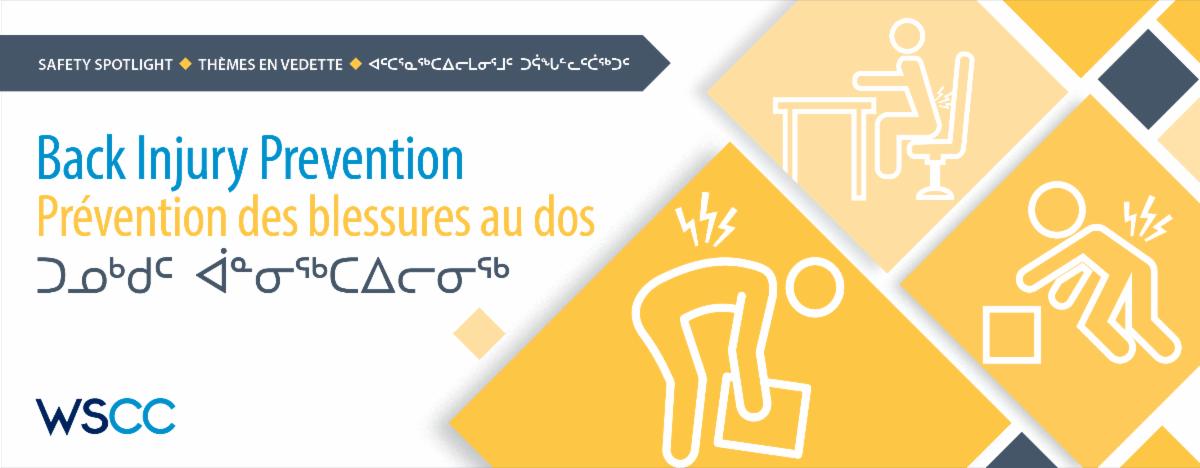 |
 |
 |
Back injuries can have lifelong impacts on your work life, personal life, and overall quality of life. While there are certain jobs that have a high risk for this type of injury, back injuries are a risk for all workers.
6 steps for Preventing Back Injuries:
- Spot the Hazards - Understand the common causes of injury (overexertion, poor ergonomics, and repetitive or inactive positions), and find the tasks and physical layouts that could cause an incident or injury from occurring.
- Policies and Procedures - Have clear guidance material for staff to refer to. Be specific about when they should use support, Personal Protective Equipment (PPE), or ask for help.
- Communicate and Train your Staff - Have resources to make staff aware of back injury prevention. The WSCC has resources to help you train workers.
- Convenience of Supports - Think through the layout of your workplace or work site. Make sure supports and PPE are convenient to grab when lifting. Workers will be more likely to use aids that are ready and available.
- Teamwork and a Strong Safety Culture - Remind employees to ask for help, and to help one another in return. As well, remind them that frequent stretch breaks, and breaks to move around are encouraged for their health and well-being.
- Early Reporting - Help workers learn and understand the signs and symptoms of injury, and encourage them to report any concerns early. Timely reporting will lead to early treatment and could prevent further or permanent injury.
To learn more about back injury prevention, and the tools and resources we have available to help your business train staff on the subject, visit our website today.
|
|
 As an employer, you play an important role in supporting an injured worker's recovery and safe return to work. WSCC is gathering feedback from employers on the challenges and barriers they experience in the return to work process. WSCC invites you to take a 5-10 minute survey. This will help to shape the development of future resources and support offered. To provide feedback click here. As an employer, you play an important role in supporting an injured worker's recovery and safe return to work. WSCC is gathering feedback from employers on the challenges and barriers they experience in the return to work process. WSCC invites you to take a 5-10 minute survey. This will help to shape the development of future resources and support offered. To provide feedback click here.
The deadline for the survey is July 9, 2021.
If you have any questions or would like to receive further information, please contact our Return to Work Specialist or (867) 920-3856.
We appreciate your feedback!
|
|
Staying up-to-date, and reviewing your safety plan

Over the past year, many businesses and workers have been diligently working to put in place their COVID-19 safety plans, also called an Exposure Control Plan. Excellent examples of ingenuity, practical thinking, and importantly, the consideration of worker and public safety are abundant in our communities. We love seeing WSCC posters and resources being used in your workplaces!
Keep the momentum going
As restrictions change quickly, the WSCC encourages everyone to keep a close watch on reliable sources of information. We recommend checking in frequently with your territorial government's COVID-19 information pages for the most up-to-date and relevant information for you ( Nunavut and NWT).
As changes occur, whether opening or tightening of restrictions, your business's COVID-19 safety plan may also need to change. Always check to see that restrictions are working and adjust when needed. Check with frontline workers to see if they have any suggestions for improvement. They are there every day, and will have a keen eye for problems and solutions for your safety planning. Reviews should be done regularly, and with every change that occurs.
If you ever have any questions related to COVID-19 safety at your workplace, email us at Covid-19@wscc.nt.ca or COVID-19@wscc.nu.ca. Check out our COVID-19 Resources page for helpful tools and posters for your workplace.
|
|
Working safely in warmer weather
As temperatures warm up and the hours of daylight increase, workers should be aware of how these changes can affect their workday. From heat stress, to heat stroke (hyperthermia), or even a mild case of heat rash, care needs to be taken to prevent heat-related illness in the warmer months.
Managing safety during WEATHER CHANGE
Nunavut and the NWT don't often get as warm as some other parts of the world. This doesn't mean that "heat" and heat related illnesses should be discounted as potential risks. Whatever temperature you are used to, if it increases by 20 degrees, you could still feel the effects of heat stress. Plan your work schedules to allow workers to acclimatize to temperature changes.
Don't forget sun protection
The north's warmer months are defined by one thing: sunshine. With long summer days, supervisors need to consider the length of time workers are spending in direct sunlight. If workers are outside, remind them to:
- Use sunscreen that has an appropriate SPF rating, and check the expiry date.
- Wear hats, sunglasses, and appropriate clothing that offers coverage.
- Drink plenty of water, particularly cool drinks when the temperatures are high.
- Take breaks from being in direct sunlight, by finding shade or going inside.
Always consider the weather conditions when scheduling work outside. WSCC has a Code of Practice on Thermal Conditions. Starting at page 29, you will find information on heat related illnesses and keeping workers safe during warmer weather conditions.
Find our Code of Practice here.
|
|
The Governance Council (GC) reviewed and approved the following policies and GC directives at its June 2021 meeting:
- 00.04 - Year's Maximum Insurable Remuneration (YMIR)
- 00.09 - Partnerships
- 07.01 - Access to WSCC Information
- 08.02 - Appealing Decisions
Please refer to the WSCC Policy Manual to view all WSCC policies or the Governance Council Directives to view all governance directives.
|
|
WSCC Offices are closed for Canada Day on Thursday, July 1st, and will reopen on Friday, July 2nd at 8:30 AM. As well, WSCC's Nunavut Office will be closed for Nunavut Day on Friday July 9th, and will reopen on Monday July 12th.
To report a serious workplace injury or incident, call 1-800-661-0792. To report unsafe work, use our online Report Unsafe Work service on WSCC Connect.
|
|
wscc.nt.ca / 1.800.661.0792 * wscc.nu.ca / 1.877.404.4407
|
|
|
|
|
|
|
|
|
|
|